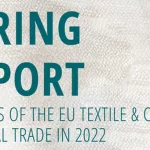Digital Passport for Textile Products
The European Commission plans to launch a Digital Product Passport (DPP), in line with its ambition to follow a circular economy. In its strategy for sustainable and circular textiles, the Commission has expressed its wish to introduce a digital passport for textile products.
The objective of this tool is to collect product data from the entire supply chain and then share it with all the value chains so that the players (manufacturers, suppliers, distributors) – including consumers – may access information on the materials that were used to make the product and on its environmental impact.
What will be listed in the passport?
In the textile industry, the digital product passport will enable the accessibility of mandatory information on the products’ circularity and on other key environmental aspects. The passport information could include substances of concern, information on how to repair the product or the product’s fiber composition, for instance.
Towards new labelling obligations?
For the sake of consistency, the Commission plans to review Regulation 1007/2011 on the labelling of textiles. Under this regulation, the only mandatory feature of the product is its fiber composition. The Commission is therefore likely to include other types of information, such as durability and circularity parameters, the size, or even the place of manufacture (“made in”).






